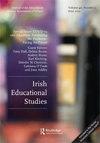A new school-based play approach for young children’s wellbeing: evidence from a 14-week study
IF 1.2
4区 教育学
Q2 EDUCATION & EDUCATIONAL RESEARCH
引用次数: 0
Abstract
ABSTRACT Individuals with anxiety disorders were traced back to have onset before aged 5 years. Early intervention is important to target preschool and primary school children. The objective of this 14-week fieldwork was to explore how we can support young children’s well-being in schools. The following research questions were identified to investigate this topic: 1. Did a 14-week ‘build-to-play’ approach lead to reports of reduced anxiety as reported by teachers, parents, and in observation reports from the researcher among a sample of 12 children (aged 4–6 years) who experience anxiety (n = 9) or anxiety and autism (n = 3)? 2. Throughout the 14-week approach, interviews with parents (n = 12) and teachers (n = 6), what were the co-construction of strategies to reduce anxiety? Twelve case studies in two primary schools in Dublin were conducted. We proposed to bring the approach to school settings as COVID-19 has accelerated the good work that children and parents may benefit more from the non-clinical settings. The theoretical frameworks were universal design for learning and bio-ecological model to design this ‘Build-to-Play’ approach as inclusive and developmentally appropriate for young children. The key findings related to education included outcomes of a reduction in childhood anxiety, improved social communication skills and executive functioning. More importantly, a collaborative understanding of what anxiety was and how to cope with it was established. For example, for children who had any risk factors of anxiety or additional needs such as autism (n = 8), a more intensive approach than the standard 14-week was needed to have better outcomes. Conceivably, this research would make an impactful contribution as change makers to educational practice, policy and theory. Keywords: anxiety, autism, play, inclusion, education.一种新的以学校为基础的儿童健康游戏方法:一项为期14周的研究的证据
焦虑症患者的发病时间可以追溯到5岁之前。早期干预对学龄前和小学儿童很重要。这次为期14周的实地考察的目的是探索我们如何在学校支持幼儿的福祉。为了研究这个主题,我们确定了以下研究问题:教师、家长和研究者对12名患有焦虑(n = 9)或焦虑和自闭症(n = 3)的儿童(4-6岁)进行的观察报告称,为期14周的“从搭建到玩耍”的方法是否导致了焦虑减少?2. 在为期14周的方法中,对家长(n = 12)和教师(n = 6)进行了访谈,探讨了如何共同构建减少焦虑的策略?在都柏林的两所小学进行了12个案例研究。我们建议将这种方法引入学校环境,因为COVID-19加速了良好的工作,儿童和家长可能会从非临床环境中受益更多。理论框架是学习的通用设计和生物生态模型,以设计这种“构建游戏”方法,使其具有包容性和适合幼儿的发展。与教育相关的主要发现包括减少童年焦虑、提高社会沟通技巧和执行功能的结果。更重要的是,建立了对焦虑是什么以及如何应对焦虑的合作理解。例如,对于有任何焦虑风险因素或额外需求(如自闭症)的儿童(n = 8),需要比标准的14周更强化的方法来获得更好的结果。可以想象,这项研究将作为变革者对教育实践、政策和理论做出有影响力的贡献。关键词:焦虑,自闭症,游戏,包容,教育。
本文章由计算机程序翻译,如有差异,请以英文原文为准。
求助全文
约1分钟内获得全文
求助全文

 求助内容:
求助内容: 应助结果提醒方式:
应助结果提醒方式:


